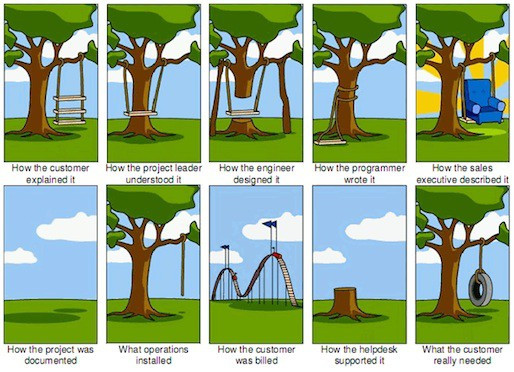Today I’m going to share some real life insights with you from a panel session I facilitated last week for the Consult Australia Queensland Division on ‘what clients want from consultants.’
The panel consisted of three economic buyer clients (two from Queensland Government departments and one from a Government Owned Corporation), 30 minutes, and me asking the questions we all want to know about what’s going on inside our client’s minds…but for some reason rarely ask.
The key take out, of course, is that no two clients want the same thing – so never make assumptions and get to know and understand them as individuals. But there were some common themes which I’ve outlined below together with some ideas on what you can do in response.
1. ‘Get to know me as a person’.
When I asked the panel what they wanted their legacy to be, the first response from one panel member was ‘my grandchildren.’ Not ‘to build an efficient port’ or ‘to design a world-class city’. Sure, these might be important to them too, but not THE most important. Remember to think about your client’s Octagon preferences – in this instance this response is giving me a strong hint that this panel member is high on feelings on the feelings/facts scale – which also means he will likely prioritise things such as staff and community well-being.
2. ‘Price is important…but not as important as innovation’.
As one panel member put it ‘It’s not about cheap design’.
3. Don’t believe that probity is a religion…even in Government.
Each person in government is more important as an individual than the Government itself. It’s still people, not systems, that make decisions.
4. ‘Try to understand the world I live in’.
Do you understand what pressures your client is under? One panel member stated that one of his key pressures was time and that there is ‘so much pressure on people to get things moving.’ Understand what these pressures are and then seek to genuinely help them. This is the intimacy element of the trust equation.
5. ‘Do what you say you will do’.
According to one panel member ‘there is a level of frustration when you don’t get responsive timing’. Reliability is critical at all stages of the relationship – from consideration to delivery. This was evident in the research presented earlier in the evening by David Goener from Beaton Capital from their annual Beaton Benchmarks survey too. Reliability consistently ranks as the number one attribute that drives clients to consider you in the first place…and it ranks number two in overall client service drivers (see the Beaton charts at the bottom of this post). So – simply do what you say you’re going to do when you say you’re going to do it.
6. ‘Quality documentation is important to us – and the more consultants can help us with this the better’.
7. ‘One thing that gets up my nose is when I get a proforma response to an RFP.’
RFPs should ALWAYS be tailored to the client, and yet laziness and time get the better of us and we just pull an old RFP, make a few changes and off we go. No surprises here – the panel told us they can always tell. Particularly when you leave another client’s name in the RFP. That’s a sure fire way to lose. Just don’t do it – not only does it imply laziness, but it also implies that you don’t care that much about the client and their individual needs. If you don’t have time to write a tailored RFP, don’t submit one at all.
8. An audience member asked the panel how they like to be contacted from ‘salespeople’ they haven’t seen before – how can they get in the door?
Responses from the panel varied from ‘come in and show us what innovation you’ve done or projects you’ve worked on that we didn’t know about’ to ‘have an engaging conversation’ to ‘I want to learn something new.’ Across the board it was key – if you want to not only get in the door but be invited BACK IN AGAIN (which is key – you can usually always get an invite once) you need to have something compelling to talk about. This is what we call ‘finding the U’ – what value will U the client, get from meeting with me?
9. ‘A relationship built on trust is key.’


